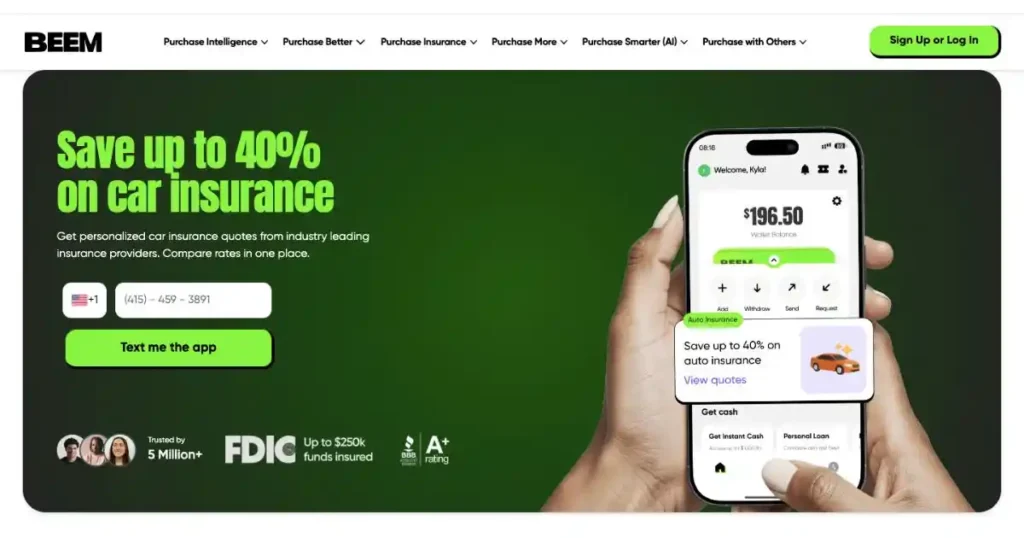Car insurance is vital to vehicle ownership, providing financial protection against accidents, damages, and liabilities. In the United States, it’s estimated that 29% of drivers switched their car insurance this year, seeking better coverage, lower premiums, or improved customer service. Switching car insurance can be a smart financial move, but it requires careful consideration and knowledge of the process. While switching car insurance, it is critical to compare car insurance quotes to get the best deal for your budget. Using Beem to find the best insurance quotes can help you make the right choice. We will further explore how to switch car insurance, the benefits and drawbacks of switching your car insurance, factors to consider when choosing the best car insurance, and commonly asked questions.
Switching Car Insurance: Pros and Cons
Pros
- Cost Savings: Switching car insurance can often lead to lower premiums, especially if you find a provider that offers better rates or discounts based on your driving record or other factors.
- Improved Coverage: By switching car insurance, you can review and enhance your coverage options to better align with your needs and priorities.
- Better Customer Service: If you’re dissatisfied with your current insurance provider’s customer service or claims handling, switching allows you to find one that offers better support and responsiveness.
- Bundle Discounts: Switching car insurance allows you to bundle your car insurance with other coverages, such as home or renter’s insurance, potentially leading to additional savings.
- Access to New Features: Insurance providers regularly update their offerings, so switching can provide access to new features or technological advancements that may benefit you.
- Relocation or Life Changes: If you have recently moved to a new state or experienced significant life changes, such as getting married or having a child, switching car insurance can help you update your coverage to reflect your current situation.
- Company Reputation: Switching car insurance allows you to choose a provider with a strong reputation for financial stability and customer satisfaction.
Cons
- Loss of Loyalty Discounts: Some insurance companies reward customer loyalty by providing discounts for maintaining coverage with them over an extended period. Switching may result in the loss of these loyalty discounts.
- Cancellation Fees: Some insurance policies have cancellation fees or penalties, so switching before your policy term is up may incur additional costs.
- Coverage Gap: When switching car insurance, it’s crucial to ensure there is no gap in coverage between the cancellation of your old policy and the activation of the new one. A coverage gap can leave you financially vulnerable in an accident or other unforeseen events.
- Re-evaluation of Risk Factors: Switching car insurance means your new provider may re-evaluate your risk factors, which could result in higher premiums if they determine you to be a higher-risk driver.
- Adjustments in Coverage: Switching car insurance may require you to adjust your coverage limits, deductibles, or other policy terms, potentially affecting your financial responsibilities in case of an accident.
- Familiarity with New Policy: Switching car insurance means becoming familiar with a new policy, including understanding its terms, conditions, and any changes in coverage or exclusions compared to your previous policy.
Why You Should Switch Your Car Insurance?
- Potential Cost Savings: Switching car insurance can result in significant cost savings, especially if you find a provider that offers more competitive rates or discounts.
- Better Coverage Options: By switching, you can explore insurance providers that offer coverage options better suited to your needs, such as higher liability limits or additional protections like roadside assistance.
- Improved Customer Service: If you’re unsatisfied with the customer service experience of your current insurance provider, switching allows you to find one with a reputation for excellent customer support.
- Life Changes: Significant life events like getting married, buying a home, or having children can impact your insurance needs. Switching car insurance allows you to update your coverage to reflect these changes.
- Relocation: Moving to a new state often requires finding a new insurance provider since coverage requirements and rates vary significantly across different regions.
- Changing Driving Habits: If your driving habits change, such as commuting less or using public transportation more frequently, switching car insurance can help you find a policy that better aligns with your updated usage.

How to Switch Car Insurance?
Switching car insurance requires a systematic approach to ensure a smooth transition. Here are the steps to follow:
- Evaluate Your Current Policy: Review your existing policy to understand your coverage, deductibles, limits, and renewal date. Identify any aspects you would like to change or improve.
- Research and Compare Insurance Providers: Obtain quotes from multiple insurance companies to compare rates, coverage options, discounts, and customer reviews. Look for providers that align with your needs and preferences.
- Assess New Policy Requirements: Ensure that the new policy meets the minimum legal requirements of your state and covers your desired level of protection.
- Notify Your Current Insurance Provider: Inform your insurance provider of your decision to switch and the effective date. Ask about any cancellation fees or penalties.
- Purchase the New Policy: Once you have selected the new insurance provider, complete the necessary paperwork, provide the requested information, and make the initial payment.
- Avoid Coverage Gaps: Ensure no lapse in coverage between your old policy’s cancellation and the new policy’s start. Coordinate the effective dates accordingly.
- Cancel Your Previous Policy: Confirm in writing the cancellation of your old policy and any required documentation. Obtain proof of cancellation.
- Update Your Documents: Update your vehicle registration and any other relevant documents with your new insurance policy information.
How to Choose the Best Car Insurance while Switching:
When choosing the best car insurance while switching, consider the following factors:
Coverage Options
Evaluate the options offered by different providers and ensure they align with your specific needs, including liability limits, comprehensive and collision coverage, and any additional protections you require.
Cost of the Policy
Compare premium rates, deductibles, and discounts among insurance companies to affirm the best pricing that fits your budget. Cheap car insurance only sometimes means it will not be comprehensive. You must be able to compare the plans.
Financial Stability
Research insurance providers’ financial stability and reputation by checking their ratings from independent rating agencies such as AM Best or Standard & Poor’s.
Customer Service
Read reviews and seek recommendations to gauge the best quality of customer service by insurance companies, including their claims process and responsiveness.
Discounts and Benefits
Inquire about discounts such as safe driving rewards, multi-policy discounts, or loyalty benefits that can help reduce premiums or add value.
Policy Terms and Conditions
Ensure to read and understand the terms and conditions of the policy carefully, including coverage limits, exclusions, and any special provisions or endorsements.
Conclusion
Switching car insurance can be a wise financial decision if done thoughtfully. By evaluating the pros and cons, understanding why you should change, following a systematic process, and considering important factors while choosing the best car insurance, you can find an insurance provider that offers coverage at a competitive price. Auto insurance costs vary widely depending on factors such as your age, driving record, and the type of vehicle you drive. Therefore, use Beem to get quotes from different insurance companies to compare prices and get the best deals. Each individual’s insurance needs may vary, so assessing your specific requirements and consulting with insurance professionals when necessary is essential.
Frequently Asked Questions
Will Switching Car Insurance Affect My Driving Record or Current Claims?
Switching car insurance will not affect your driving record or current claims. However, disclosing any existing claims or accidents to your new insurance provider is crucial during application.
How Long Does it Take to Switch Car Insurance?
The time it takes to switch car insurance can vary by insurance provider and individual circumstances. Typically, the methodology can be completed within a few days to a few weeks.
Can I Switch Car Insurance in the Middle of My Policy Term?
Yes, you can switch car insurance during your policy term. However, remember that cancellation fees or penalties may be associated with terminating your current policy before its expiration date.
















































